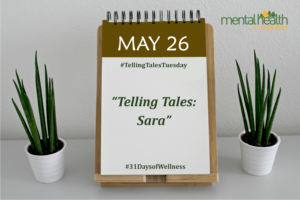Contributed by: Janet Reynolds
 Sara defined herself as a writer before she joined Write On! An experienced poet, she performed her works and had been writing regularly for years.
Sara defined herself as a writer before she joined Write On! An experienced poet, she performed her works and had been writing regularly for years.
But Write On!, she says, opened her eyes to a different way of writing and a new way to look at her own life story. “I always have had a technical approach to writing,” she says. “I had a lot of professional training, but it didn’t provide me with the lens on my mental illness. I wanted to take Write On! because I wanted to write specifically from a mental health viewpoint.”
Through the workshop, she learned “various techniques to hack into my more sensitive private parts of my journey. Write On! helped me break out of my confined writing space. I benefited from the practices we did but from also the community and how we all came from different backgrounds. That was inviting and good for everyone’s mentality.”
Now 26, Sara spent the majority of her adolescence in facilities, separated from her family for behaviors she couldn’t control. While there, she experienced abuse from students and staff. “I was deprived of an adolescence,” she says. “One of my biggest missions is trying to figure out is how to make an impact in residential treatment facilities. They need to understand that every person is unique. It’s not a one-size-fits-all program.”
Sara understands that first-hand. Ultimately diagnosed with schizophrenia after 12 other diagnoses, (she no longer has that diagnosis), she had a lot of treatments that “confused me and physically impaired me. It’s important to let someone come into adulthood without a diagnosis,” she says. “Diagnosis makes your identity. That’s what you begin to practice and meditate on.”
Today Sara is a full-time student at Eastern Connecticut State University where she’s an early childhood education major on her way to becoming an elementary school teacher and perhaps a literacy coach or creative writing teacher. She continues to write and plans to publish a chapbook. “I’m trying to get a shelf life,” she says of the book. “I have done spoken word for a while.”
Expanding her writing style has brought Sara new clarity on herself as well. Sometimes spoken word can be unintentionally limiting. “There’s one poem for mental health, one poem for your mom,” she says. “Write On! was the tip of that iceberg for me to start writing again and start hacking into the big brain bank of all my experiences. That was scary. Write On! was a formal and highly emotionally welcoming place for me to write and be myself.
“I feel far from my mental illness right now,” she continues. “It’s not in my identity. The next step is to bring it back into a new space, to write about who I am today by using material from things are prevalent in many people’s lives.”
Here’s what Sara shared in her final project with Write On!
To support individuals like Sara, visit www.mhconn.org/31days and donate today!
#TellingTalesTuesday
#31DaysofWellness

